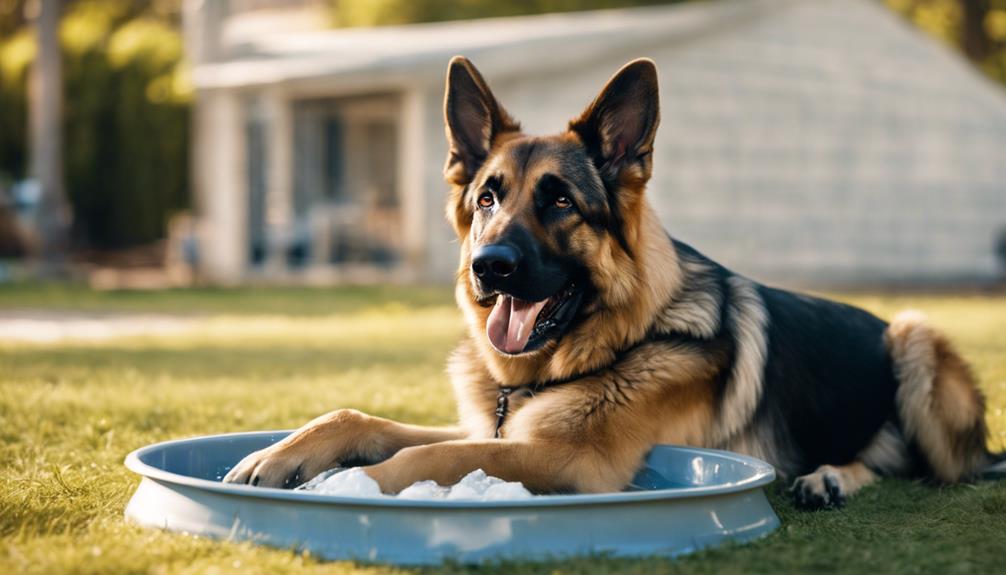🐾 Paw-some Partnership Alert! 🐾
As a pack of German Shepherd enthusiasts at MixGermanShepherd.com, we're always sniffing out the best products for our furry friends. Guess what? When you fetch something from Amazon through our links, we earn a little treat! 🦴
As the seasons shift, the well-being of your German Shepherd mix, with its unique blend of traits, becomes a top priority. From managing allergies in spring to ensuring proper skin care strategies in winter, the changing weather can impact your furry companion's health. Understanding and addressing these seasonal concerns are essential for maintaining your German Shepherd mix's overall health and happiness. Stay tuned to discover practical tips and insights that can help you navigate these challenges effectively and keep your beloved pet in optimal condition year-round.
Key Takeaways
- Address spring allergies with grooming, treatments, and environmental control.
- Prevent summer heat stroke with shade, water, and monitoring for signs of exhaustion.
- Focus on joint health in fall with supplements, tailored exercises, and vet consultations.
- Prevent winter dry skin by protecting paws, providing omega-3 fatty acids, and maintaining hydration.
Spring: Allergy Management

During spring, managing allergies in your German Shepherd mix is crucial to ensure their health and comfort. Spring brings an increase in pollen and environmental allergens that may trigger allergic reactions in your pet. Watch out for symptoms such as itching, scratching, redness, and skin irritation, which could indicate seasonal allergies. To alleviate these issues, regular grooming and bathing are essential to remove allergens from your German Shepherd mix's coat and skin. Consider consulting with a vet for allergy testing and proper medication to effectively manage their seasonal allergies. Monitoring your pet's diet and outdoor activities during spring can also help reduce their exposure to allergens and minimize allergic reactions. By taking these proactive steps, you can help your German Shepherd mix navigate through spring with greater ease and comfort.
Summer: Heat Stroke Prevention

To prevent heat stroke in your German Shepherd mix during the summer months, it is essential to be mindful of their susceptibility to this condition due to their thick double coat and high energy levels. German Shepherd mixes are prone to heat stroke, which can be life-threatening if not addressed promptly. Signs of heat stroke in your pet include excessive panting, drooling, an elevated heart rate, weakness, and even collapse. To prevent this, ensure your furry friend has access to shade, fresh water, and limit their exercise during hot weather. Never leave your German Shepherd mix in a hot car, as temperatures can rise rapidly and lead to heat-related issues. Walk your pet during cooler times of the day, and provide access to cool surfaces to help regulate their body temperature. If you suspect heat stroke, contact your veterinarian immediately to prevent serious health complications. Remember, proactive prevention is key to keeping your German Shepherd mix safe and healthy during the summer.
Fall: Joint Health Maintenance

As the fall season approaches, it's crucial to focus on maintaining the joint health of your German Shepherd mix. Consider incorporating joint supplements into your furry friend's routine to support their joints during this time. Alongside regular exercise tailored for joint health and a diet rich in nutrients that promote joint function, you can help your dog stay active and comfortable throughout the fall.
Joint Supplements for Fall
Incorporating joint supplements into your German Shepherd mix's fall care routine can significantly contribute to maintaining their joint health during this season. Fall weather changes can impact your dog's joints, making supplementation crucial for their well-being. Look for supplements containing glucosamine and chondroitin, as these ingredients are known to support joint mobility and comfort. Consistent use of these supplements can help prevent or alleviate joint stiffness and discomfort in German Shepherd mixes. To ensure the right choice and dosage for your pet, consult with your veterinarian. By proactively addressing joint health with supplements, you can help your German Shepherd mix stay active and comfortable throughout the fall season.
Exercise Routines for Joints
Maintaining the joint health of your German Shepherd mix during the fall season requires implementing tailored exercise routines that promote mobility and prevent stiffness. To ensure your furry friend's joints stay healthy, consider the following:
- Incorporate a Variety of Activities: Include walking, swimming, and gentle running to strengthen muscles around the joints.
- Control Exercise Intensity: Opt for controlled sessions in cooler weather to enhance joint flexibility and overall fitness.
- Avoid High-Impact Exercises: Steer clear of activities that may strain the joints, and provide ample rest periods during workouts.
- Seek Professional Guidance: Consult with a veterinarian or trainer to develop a customized exercise plan suited to your German Shepherd mix's specific needs.
Diet for Joint Health
Fall presents an ideal opportunity to optimize your German Shepherd mix's joint health through a well-balanced diet rich in essential nutrients. German Shepherds are prone to hip dysplasia, making it crucial to focus on joint health, especially during this season of increased joint stress. Ensure their diet includes omega-3 fatty acids, glucosamine, and chondroitin to support joint health and reduce inflammation. Additionally, consider incorporating joint supplements recommended by veterinarians to aid in maintaining healthy joints as they age. Regular exercise tailored to their specific needs can also strengthen muscles around the joints, promoting overall joint health. Monitoring their weight and managing their calorie intake are vital aspects to prevent joint issues and enhance mobility in your beloved German Shepherd mix.
Winter: Skin Care Strategies

During winter, your German Shepherd mix may experience dry skin due to the cold weather and indoor heating. To combat this, focus on moisturizing paw protection and coat conditioning tips to keep their skin healthy. Providing a balanced diet rich in omega-3 fatty acids and ensuring adequate hydration are key strategies to maintain your pup's skin during the colder months.
Moisturizing Paw Protection
To protect your German Shepherd mix's paws during winter, consider applying moisturizing paw balms or waxes to prevent dryness and cracking. Here are some tips to help you maintain your furry friend's paw health:
- Choose a high-quality paw balm or wax specifically designed for dogs to provide maximum protection.
- Apply the product before walks to create a barrier against harsh winter conditions like salt and ice melt chemicals.
- Make sure to massage the balm or wax into your dog's paw pads thoroughly for complete coverage.
- Be consistent with the application to ensure long-lasting protection and keep your German Shepherd mix's paws healthy and happy throughout the season.
Coat Conditioning Tips
For optimal winter skin care for your German Shepherd mix, implementing effective coat conditioning tips is crucial to maintain skin health and prevent dryness. To ensure your pup's coat stays healthy and shiny during the cold months, follow these essential tips:
| Coat Conditioning Tips | Description | Importance |
|---|---|---|
| Regular Grooming | Prevents dry skin and irritation caused by cold weather. | Essential for skin care maintenance. |
| Moisturizing Shampoo | Helps maintain coat health and prevents flakiness in winter. | Keeps the coat hydrated. |
| Paw Balm Application | Protects paw pads from ice, snow, and salt during winter walks. | Ensures paw health and comfort. |
| Balanced Diet | Rich in omega-3 fatty acids to improve skin health and maintain a shiny coat. | Vital for overall skin care. |
Temperature Regulation in Summer

In the summer months, German Shepherd mixes may face challenges with temperature regulation due to their double coat, which can trap heat. To help your furry companion stay comfortable and safe during hot weather, consider the following tips:
- Provide Ample Shade: Ensure your German Shepherd mix has access to shady areas where they can escape the direct sun.
- Offer Fresh Water: Keep your pet well-hydrated by providing a constant supply of cool, fresh water.
- Avoid Excessive Exercise: Limit strenuous activities during the hottest parts of the day to prevent overheating.
- Watch for Warning Signs: Be vigilant for symptoms of heat exhaustion such as excessive panting, drooling, weakness, or collapse.
Exercise Precautions in Winter

German Shepherd mixes require careful consideration and adjustments to their exercise routines during winter to safeguard against potential health risks like hypothermia and frostbite. It's essential to be mindful of the colder temperatures and their impact on your furry friend's well-being. To help you navigate this season with your German Shepherd mix, here are some exercise precautions to keep in mind:
| Exercise Precautions in Winter | Tips for German Shepherds |
|---|---|
| Shorter Exercise Sessions | Opt for shorter but more frequent walks to prevent overexertion in the cold. |
| Indoor Activities | Engage in indoor games like puzzle toys or obedience training to keep them mentally stimulated. |
| Paw Care | Check paw pads for ice buildup and consider using pet-safe de-icing products to avoid injuries during walks. |
Flea and Tick Prevention in Spring

To ensure your German Shepherd mix stays healthy this spring, understanding the risks of ticks and the importance of flea prevention is essential. By utilizing vet-approved products and exploring seasonal treatment options, you can effectively safeguard your pet from these parasites. Regular grooming and vigilant checks will further aid in preventing flea and tick infestations that could harm your beloved German Shepherd mix.
Spring Tick Risks
During the spring season, safeguarding your German Shepherd mix from tick-borne diseases becomes paramount, necessitating proactive flea and tick prevention measures. Here are essential tips to protect your furry friend:
- Regular Grooming: Brush your German Shepherd mix regularly to check for ticks hiding in their fur.
- Tick Prevention Products: Use vet-recommended tick prevention products to keep these parasites at bay.
- Outdoor Checks: After outdoor activities, inspect your dog for ticks, especially around the ears, neck, and paws.
- Environment Maintenance: Keep your living area clean and avoid tall grass and wooded areas where ticks thrive.
Flea Prevention Methods
For effective prevention against fleas and ticks during spring, implementing a combination of proactive measures is crucial to safeguard your German Shepherd mix's health and well-being. Fleas can cause discomfort and health issues in German Shepherd mixes, including itching, skin irritation, and potential allergic reactions. Utilizing flea prevention methods such as topical treatments, oral medications, flea collars, and environmental control is essential to protect your pet from infestations. Given that spring is a peak season for flea activity, starting flea prevention early is vital to avoid health risks. Regular grooming, vacuuming, and washing bedding can complement flea prevention efforts and reduce the likelihood of infestations in your German Shepherd mix. Consult with your veterinarian to determine the most effective flea prevention method tailored to your pet's individual needs and health condition.
Seasonal Treatment Options
When considering seasonal treatment options for flea and tick prevention in spring, prioritizing your German Shepherd mix's health through vet-recommended products and regular grooming is essential. Here are four key steps to protect your furry friend:
- Use vet-recommended flea and tick prevention products.
- Conduct regular grooming sessions to check for signs of fleas or ticks.
- Be cautious during outdoor activities in wooded areas.
- Implement a comprehensive prevention plan, including environmental control measures.
Nutrition Adjustments in Fall

Incorporate seasonal ingredients like pumpkin to support digestive health and immunity in your German Shepherd mix's fall diet. German Shepherds may benefit from the addition of pumpkin, a fiber-rich food that aids in digestion and provides essential nutrients like vitamins A and C. Additionally, adjusting your dog's diet to include omega-3 fatty acids can promote coat health and support joint function during the fall season. Be mindful of calorie intake to prevent weight gain and ensure your German Shepherd mix maintains a healthy body condition. Introducing warm, cooked foods can aid in digestion and offer comfort as the weather cools. If your dog suffers from seasonal allergies, consider modifying their diet to manage symptoms and support overall well-being. By making these nutrition adjustments tailored to the fall season, you can help your German Shepherd mix stay healthy and thriving throughout this time of year.
Seasonal Shedding Control

To effectively manage seasonal shedding in your German Shepherd mix, prioritize regular grooming and a balanced diet rich in essential nutrients to support healthy skin and coat. Here are some tips to help you control seasonal shedding:
- Brushing: Regularly brush your German Shepherd mix to remove loose fur and prevent matting. Use a deshedding tool during peak shedding seasons to minimize hair around your home.
- Bathing: Give your dog occasional baths with a vet-approved shampoo to maintain skin health and reduce shedding. Avoid over-bathing, as it can strip the skin of natural oils.
- Nutrition: Provide a balanced diet high in omega-3 fatty acids and proteins to promote a healthy coat and reduce excessive shedding. Consult your vet for dietary recommendations tailored to your dog's needs.
- Hydration: Ensure your German Shepherd mix stays well-hydrated to support overall skin health and minimize dryness, which can contribute to increased shedding.
Paw Care in Hot Weather

During hot weather, it is essential to prioritize paw care for your German Shepherd mix to prevent paw pad burns from walking on hot surfaces. Paw pad burns can be painful and lead to discomfort for your furry friend. To protect their paws, consider using paw wax or booties when going out for walks in the summer months. Signs of paw pad burns include limping, blisters, redness, and sensitivity to touch. Providing cooling mats or access to shaded areas can offer relief for your German Shepherd mix from hot surfaces. Additionally, regularly checking and moisturizing their paw pads can help prevent dryness and cracking, ensuring their paws stay healthy and strong. Below is a table highlighting some key tips for paw care in hot weather:
| Paw Care Tips | Description |
|---|---|
| Use paw wax or booties | Protects paws from hot surfaces during walks in the summer months |
| Check for signs of paw pad burns | Look out for limping, blisters, redness, and sensitivity to touch |
| Provide cooling mats or shaded areas | Offers relief from hot surfaces |
| Moisturize paw pads regularly | Prevents dryness and cracking in hot weather |
| Avoid walking on hot pavement | Opt for cooler times of the day for walks or walk on grassy areas |
Seasonal Allergy Treatment

As you care for your German Shepherd mix's paws in hot weather, it's important to acknowledge the impact seasonal allergies can have on their health. Seasonal allergies in German Shepherd mixes can lead to itching, redness, and skin irritation, often triggered by environmental factors like pollen, grass, or mold. To address these issues effectively, consider the following:
- Treatment Options: Explore remedies such as antihistamines, corticosteroids, medicated shampoos, and allergy testing to pinpoint specific triggers causing discomfort.
- Grooming Practices: Regular grooming and bathing routines can help reduce allergens on your dog's skin and coat, potentially easing seasonal allergy symptoms.
- Veterinary Consultation: Seek guidance from a veterinarian for accurate diagnosis and tailored management strategies to alleviate seasonal allergy-related skin issues.
- Diet Adjustments: Enhance your German Shepherd mix's diet with omega-3 fatty acids and supplements known to support skin health, aiding in the reduction of allergy symptoms.
Winter Weight Management

During the winter months, it's essential to monitor the weight of your German Shepherd mix closely to prevent potential weight gain due to decreased activity levels and increased calorie consumption. German Shepherd mixes are prone to hip dysplasia, a condition exacerbated by excess weight. To manage your dog's weight effectively, consider adjusting their food intake based on their reduced activity levels during winter. Providing indoor activities and interactive toys can help stimulate both mental and physical exercise, combating weight gain. Regular weigh-ins and body condition assessments are crucial for tracking your German Shepherd mix's weight and making any necessary adjustments to their diet or exercise routine. Remember that maintaining a healthy weight not only prevents winter weight gain but also reduces the risk of hip dysplasia and other health issues in German Shepherd mixes. Stay proactive in managing your dog's weight to ensure their overall well-being throughout the colder months.
Frequently Asked Questions
Do German Shepherd Mixes Have Health Problems?
Yes, German Shepherd mixes may experience health problems like skin issues, fur shedding, and specific dietary needs. Regular vet visits and a balanced diet can help manage these concerns. Providing proper care is essential for their well-being.
Do German Shepherds Have Seasonal Allergies?
You feel like seasonal allergies are a never-ending battle for your German Shepherd. Regular grooming, like baths to remove allergens, can help. Keep an eye out for symptoms and consult your vet for the best treatment options.
What Is the Most Common Problem in German Shepherds?
The most common health issues in German Shepherds include hip dysplasia, EPI, DM, VWD, and arthritis. Prevention tips such as regular vet check-ups, a balanced diet, exercise, and genetic testing can help manage these conditions effectively.
What Conditions Are German Shepherds Predisposed To?
You should be aware of the genetic predispositions in German Shepherds, including hip dysplasia and Exocrine Pancreatic Insufficiency. By understanding these conditions and meeting their dietary requirements, you can help your furry friend live a healthier life.
Conclusion
In conclusion, it's essential to be proactive in addressing seasonal health concerns for your German Shepherd mix. Did you know that 50% of Black German Shepherds are prone to seasonal allergies? By staying vigilant and implementing proper care strategies, you can help your furry friend stay healthy and happy year-round. Remember, a little extra attention during seasonal transitions can make a big difference in your dog's well-being.
